一般疑问句和特殊疑问句(课堂PPT)
合集下载
小学英语语法一般疑问句和特殊疑问句PPT课件

2、如句子里是动词就在这些词前加 don't,doesn't,didn't
(1)主语是第一、二人称(复数)加don’t,第三人称单数加
doesn't
(2)如果是过去式就加didn't
例:I like dogs.
She likes swimming.
I don‘t like dogs.
She doesn’t like swimming.
A How B Where C What D Who
3.A: Was this book in the desk?
B: ___D____
A Yes,it is. B No,it was C Yes,it wasn’t D No,it wasn’t
4.A: ____A___ heavy is John?
Thank You !
e.g经营者提供商品或者服务有欺诈行为的,应当按照消费者的要求增加赔偿其受到的损失,增加赔偿的金额为消费者购买商品的价款或接受服务的费用
This is Amy's bike.(一般疑问句) Is this Amy's bike? Yes, this is. (肯定回答) No, this isn't. (否定回答) Did you go to Beijing last weekend? Yes, I did. (肯定回答) No, I didn't. (否定回答) I have some books. (一般疑问句) Do you have any books?
特殊疑问句
表示疑问,有疑问词(在开头),回答有很
多种可能。
常用疑问词:
When 什么时间 (问时间)
小学四年级英语下册-一般疑问句-特殊疑问句-ppt课件
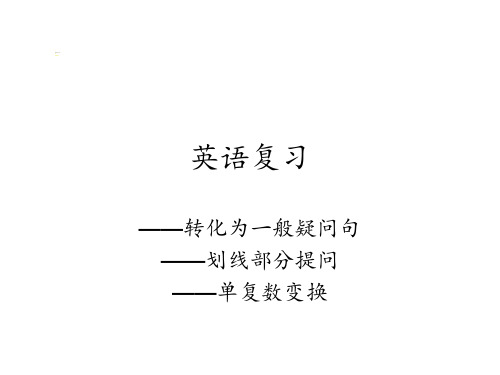
This orange shirt is Lulu's. →is This orange shirt Lulu's. →whose is This orange shirt. →Whose is this orange shirt?
She is in Grade Four. →is She in Grade Four. →what grade is She in. →What grade is she in?
What time 什么时间 用来问时间
1. What’s your name? 你叫什么名字?2. What’s your father?你爸爸是干什么的?3. what is in your box? 你的盒子里是什么?4 what is weather like in Beijing?
1.What time is it? 几点了?2.What time is it now? 现 在几点了?
哪里
用来征求意见或询问感受等,大多用于承接上面的同样问题
用来问数量 用来问年龄 用法与what about相同 用来问地点
1.what bout this pair of shoes?这双鞋子怎么样? 2.what about you?你呢?3.what about your dad?你爸 爸呢?
1.How many apples do you have? 你有多少苹果? 2.How many students are there in your class ?你班有 多少学生?
• “太阳当空照,花儿对我笑,小鸟说早早早……”
I am a teacher. →am I a teacher. →am you a teacher. →Are you a teacher?
She is in Grade Four. →is She in Grade Four. →what grade is She in. →What grade is she in?
What time 什么时间 用来问时间
1. What’s your name? 你叫什么名字?2. What’s your father?你爸爸是干什么的?3. what is in your box? 你的盒子里是什么?4 what is weather like in Beijing?
1.What time is it? 几点了?2.What time is it now? 现 在几点了?
哪里
用来征求意见或询问感受等,大多用于承接上面的同样问题
用来问数量 用来问年龄 用法与what about相同 用来问地点
1.what bout this pair of shoes?这双鞋子怎么样? 2.what about you?你呢?3.what about your dad?你爸 爸呢?
1.How many apples do you have? 你有多少苹果? 2.How many students are there in your class ?你班有 多少学生?
• “太阳当空照,花儿对我笑,小鸟说早早早……”
I am a teacher. →am I a teacher. →am you a teacher. →Are you a teacher?
一般疑问句和特殊疑问句PPT课件
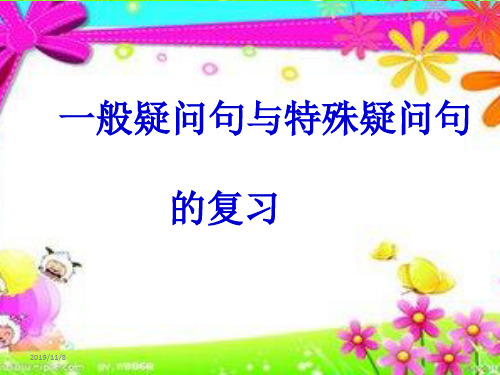
( B )3.-Have you got a kite? –No, I______. A.have. B.haven’t C.don’t
( C )4.___ can be my friend? –Sam. A.How B.When C.Who
( B )5.___ are you? –I’m in Beijing. A.What B.Where C.Why
一般疑问句与特殊疑问句 的复习
2019/11/8
Let’s dance:一起来跳舞
2019/11/10
优质
2
你见过这种题型吗?
2019/11/10
优质
3
你见过这种题型吗?
2019/11/10
优质
4
一般疑问句与 特殊疑问句的 复习
2019/11/10
优质
5
一般疑问句:常以do/does/did,
考 题
。 C.Yes, I’d love to. √ Yes, I do.
D.You are welcome.
E.These are books about animals.
2019/11/10
优质
21
购 物
A:Can I help you? What do you want?
B:I want a hot dog.
优质
19
2016
(E )1._D_o you like meat? √
请 像
(C )2._C_a_n you run fast? √
毕 (A )3._W_h_e_r_e did you go?
老 师 这
业 (B )4.What’s your hobby?
样
考 试
( C )4.___ can be my friend? –Sam. A.How B.When C.Who
( B )5.___ are you? –I’m in Beijing. A.What B.Where C.Why
一般疑问句与特殊疑问句 的复习
2019/11/8
Let’s dance:一起来跳舞
2019/11/10
优质
2
你见过这种题型吗?
2019/11/10
优质
3
你见过这种题型吗?
2019/11/10
优质
4
一般疑问句与 特殊疑问句的 复习
2019/11/10
优质
5
一般疑问句:常以do/does/did,
考 题
。 C.Yes, I’d love to. √ Yes, I do.
D.You are welcome.
E.These are books about animals.
2019/11/10
优质
21
购 物
A:Can I help you? What do you want?
B:I want a hot dog.
优质
19
2016
(E )1._D_o you like meat? √
请 像
(C )2._C_a_n you run fast? √
毕 (A )3._W_h_e_r_e did you go?
老 师 这
业 (B )4.What’s your hobby?
样
考 试
七年级英语一般疑问句和特殊疑问句ppt课件
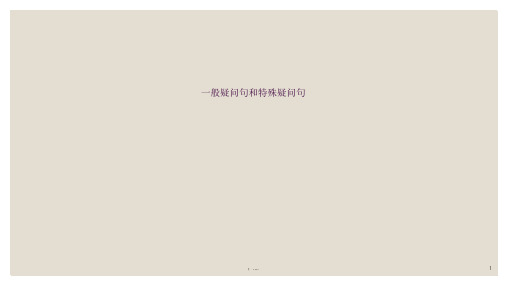
◦ ________________________________________ 4.She can sing that song.
◦ ________________________________________ 5.We must follow the traffic rules.
◦ ________________________________________ 6.I must wash my hands before lunch.
加doesn?tdidnt的句子注意句子动词要变成原观察一下这些肯定句变成一般疑问句的规律是怎么样的
一般疑问句和特殊疑问句
;....
1
观察一下,这些肯定句变成否定句的规律是怎么样的?
;....
2
◦ be动词
;....
3
◦ 肯定句: ◦ They are in the park. ◦ 否定句: ◦ They are not in the park.
1. There is a big clock.
Is there a big clock
?
2.This is my bag.
Is this your bag
?
3.I am a student
Are you a student
?
1. Be 动词提到句首,其他照抄,句尾加问号。 2. I 变为you,my 变为your. some 变any.
;....
29
◦ 特殊疑问词的用法
◦ 例句 who 谁问人的身份,姓名等 ◦ He is LiLie. ◦ Who is he ? ◦ He is my brother. ◦ Who is he ?
;....
◦ ________________________________________ 5.We must follow the traffic rules.
◦ ________________________________________ 6.I must wash my hands before lunch.
加doesn?tdidnt的句子注意句子动词要变成原观察一下这些肯定句变成一般疑问句的规律是怎么样的
一般疑问句和特殊疑问句
;....
1
观察一下,这些肯定句变成否定句的规律是怎么样的?
;....
2
◦ be动词
;....
3
◦ 肯定句: ◦ They are in the park. ◦ 否定句: ◦ They are not in the park.
1. There is a big clock.
Is there a big clock
?
2.This is my bag.
Is this your bag
?
3.I am a student
Are you a student
?
1. Be 动词提到句首,其他照抄,句尾加问号。 2. I 变为you,my 变为your. some 变any.
;....
29
◦ 特殊疑问词的用法
◦ 例句 who 谁问人的身份,姓名等 ◦ He is LiLie. ◦ Who is he ? ◦ He is my brother. ◦ Who is he ?
;....
最新文档-一般疑问句,特殊疑问句,反义疑问句变法课件(PPT13张)-PPT精品文档
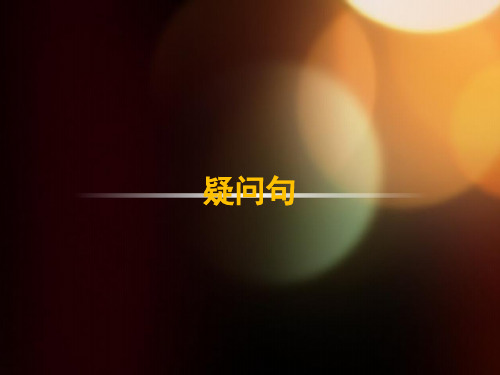
小大 人
句
写写 称
号
变变 变
变
大小 二
问
写写 人
号
称
Can you play basketball?
如何变一般疑问句
步骤:一找二提三变
找情be助 提情be助到句首 变人称、动词形式和标点符号 She does hhaavse some book.
does She一have some book.
some any
is This一my book.
小大 人
句
写写 称
号
变变 变
变
大小 二
问
写写 人
号
称
Is this your book?
如何变一般疑问句
步骤:一找二提三变
找情be助 提情be助到句首 变人称、动词形式和标点符号 I can play basketball.
can I pl一ay basketball.
Can you play ping-pong ? Yes, I can. / No, I can’t.
结构:be 动词(is, am, are)
助动词(do,does,will, have,has)
+主语+其他成分+?
情态动词(can)
如何变一般疑问句
步骤:一找二提三变
找情be助 提情be助到句首 变人称、动词形式和标点符号 This is my book.
误
Where are you from/where do you come from? 正
How's the weather like?
误
How's the weather?/What's the weather like?
一般疑问句与特殊疑问句教学ppt课件
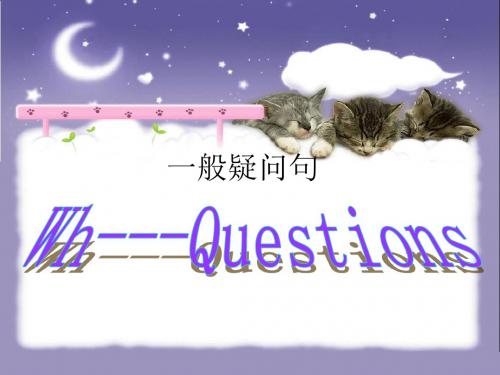
什么是特殊疑问句?
Studying aims:
1.能够准确说出 特殊疑问词的中文
意思。
2.能够根据语境,选择恰当的特殊 疑问词。
特殊疑问句 = 特殊疑问词 + 一般疑问句
特殊疑问句
1. 含义:特殊疑问句是指以 Wh- (How) 等特殊疑问词开头,对陈述句中某一 部分提问的句子。回答时不用Yes/No, 而是用一个句子或短语回答。
2.Whose bike is yellow? 谁的自行车是黄色的? ※ 一般后面跟名词。
Why,为什么
问原因
1.Why do you like spring? 你为什么喜欢春天? Because I can fly kites in spring. 因为在春天我可以放风筝。
2.Why do you go to school by bus?为什么你坐公共汽 车来学校?
Who,谁
问人是谁
1.Who is that boy? 那个男孩是谁?
2. Who are you going to with? 你打算和谁一起去?
3. Who is that beautiful girl? 那个漂亮的女孩是谁?
Whose,谁的
问东西是谁的
1.Whose bag is this? 这是谁的包?
一般疑问句
一般疑问句
• 主要由be动词、情态动词或助动词来开头。
(1) Is Han Mei in Class Four? (2) Can you spell your name, please? (3) Does he go to school every day?
be动词: am, is, are, was, were 情态v: can, could,may, might, will, shall,would, must, need, should, … 助动词: do does did has/have(已经) some在否定句, 疑问句中 要变成 any
小学英语语法---一般疑问句和特殊疑问句 PPT

(2)如果是过去式就加didn't
例:I like dogs.
She likes swimming.
I don‘t like dogs.
She doesn’t like swimming.
3、如句子里是情态动词是must,can,may,should 就在这些词后
加not
例句:You can watch TV now.
5. How was you weekend?
E. I watched TV.
Choose:选择
1. A: ___B____ did you go last Sunday?
B: I went to the library.
A When B Where C What D Who
2.Amy: __D_____ bought the new bike for you?
变否定句的做法:
1、如句子里是be动词:am,is,are,was,were 就在这些词后加 not
例: He is Tom.
He is not Tom.
2、如句子里是动词就在这些词前加 don't,doesn't,didn't
(1)主语是第一、二人称(复数)加don’t,第三人称单数加
doesn't
大家应该也有点累了,稍作休息
大家有疑问的,可以询问和交流
Mike: W__h_e_r_eare we going to this year? Mum: we will go to Harbin. Mike: _W_h_e_n__are we going to Harbin? Mum: On 10th Octomber. Mike: _H_o_w___do you go to there? Mum: By plane. Mike: W__h_e_re_are we going to stay in Harbin? Mum: In Grandma’s big house. Mike: _W_h_a_t_does Grandma like eating? Mum: She likes eggs very much. Mike: W__h_ic_h__season is the best time to Harbin? Mum: Winter. Mike: W__h_y__? Mum: Because we can make a snowman there.
通用小升初英语总复习一般疑问句和特殊疑问句讲解课件

Did they go to the Great Wall last year?
5. She felt upset about her weight.
Did she feel upset about her weight?
1.你是1995年诞生的吗? Were you born in 1995 ?
8.Are you eating lunch? 你(们)正在吃午餐吗? Yes, I am. / Yes, we are. 是的,我(们)正在吃。 No, I am not. / No, we aren't. 不,我(们)没有在吃。
9.Is he playing chess? 他正在下棋吗? Yes, he is. 是的,他是。/ No, he isn't. 不,他没有。
4.对指人名词或人称代词提问用who 例:Li Ping is my sister. —Who is Li Ping?
5.对物主代词和名词所有格提问用whose 例:Li Ping's coat—whose coat
my father—whose father
6.对具体时间提出疑问,疑问词用when;对具体几 点钟提问,用what time 例:It's 10:00. —What time is it?
• 问时间点
2. what colour
• 什么颜色
3. what weather
• 什么天气
4. 什么学科
• what subject
5. 多少
• How many/much
6. 多长
• How long:
7. 多少钱价格
• How much
8. 多少次(问频率) • How often
5. She felt upset about her weight.
Did she feel upset about her weight?
1.你是1995年诞生的吗? Were you born in 1995 ?
8.Are you eating lunch? 你(们)正在吃午餐吗? Yes, I am. / Yes, we are. 是的,我(们)正在吃。 No, I am not. / No, we aren't. 不,我(们)没有在吃。
9.Is he playing chess? 他正在下棋吗? Yes, he is. 是的,他是。/ No, he isn't. 不,他没有。
4.对指人名词或人称代词提问用who 例:Li Ping is my sister. —Who is Li Ping?
5.对物主代词和名词所有格提问用whose 例:Li Ping's coat—whose coat
my father—whose father
6.对具体时间提出疑问,疑问词用when;对具体几 点钟提问,用what time 例:It's 10:00. —What time is it?
• 问时间点
2. what colour
• 什么颜色
3. what weather
• 什么天气
4. 什么学科
• what subject
5. 多少
• How many/much
6. 多长
• How long:
7. 多少钱价格
• How much
8. 多少次(问频率) • How often
- 1、下载文档前请自行甄别文档内容的完整性,平台不提供额外的编辑、内容补充、找答案等附加服务。
- 2、"仅部分预览"的文档,不可在线预览部分如存在完整性等问题,可反馈申请退款(可完整预览的文档不适用该条件!)。
- 3、如文档侵犯您的权益,请联系客服反馈,我们会尽快为您处理(人工客服工作时间:9:00-18:30)。
一般说来特殊疑问句在句尾朗读时用降调(↘)。
10
Who谁——Whose谁的
Why为什么 When什么时候 Where在哪里 Which哪一个
What什么 ( What time什么时间 What colour 什么颜色)
How怎么样(How many多少{数量} How much多少钱{价格},多少(对不可数名词进 行提问) How long多长 How often多少次 How big多大 How heavy多重{重量}
What does she look like﹖
Where are you from﹖
How do you know﹖
What class are you in﹖ 14
Practice
就划线部分提问: (先一般后特殊)
1. She is American. 2. His father is in the living room. 3. The chair is blue. 4. I am from China.
8
I like these animals. → Do you like these animals﹖ She wants to go to the movies. →
Does she want to go to the movies﹖ He went to Guangzhou yesterday. → Did he go to Guangzhou yesterday?
一般疑问句和特殊疑问句
句子构成、回答形式和 声调
1
一般疑问句
一般疑问句是疑问句的一种。
定义:它是指用yes(是)或 no(否)来回答的句子。
2
一般疑问句
(1) Is Han Mei in Class Four? (2) Can you spell your name, please? (3) Does he go to school every day?
9
特殊疑问句
以疑问词开头: what, who, whose, which, when, where, why, how, how many, how much, how old 等。 (1) Where are you from? (2) Who is he? (4) How many girls are there in your class? (5) Which film star do you like best?
(3)Do you do your homework at home? Yes, I do. / No, I don't.
一般只用yes或no的形式来回答。
4
陈述句 变一般疑问句
She is a teacher. He can play basketball. I go to bed at eight o’clock.
How far多远{路程} 11
特殊疑问句的回答形式
问什么答什么。例如:
(1)What class are you in? I am in Class Four, Grade One.
(2)How old are you? I am ten.
(3)Where is "A"? It is here.
15
翻译练习
1. 你们喜欢英语吗? 2. 我真的需要这些规则吗? 3. 将来学生如何参加考试? 4. 英国人喜欢什么类型的礼物
? 5.你有几块手表呢?
16
He can swim now. → Can he swim now﹖
7
注意事项 陈述句变一般疑问句:
3.陈述句中只有一个实义动词作谓语。 当时态为一般现在时,变为一般疑问句时 要在句首加do或does, 主语后的实义动 词用原形。当时态为一般过去时,变为一 般疑问句时要在句首加did, 主语后的实 义动词用原形。如:
主要由be动词、情态动词或助动词来开头。
系动词be/助动词/情态动词+主语+其 他成分
在一般疑问句的句尾朗读时用升调(↗)。 3
一般疑问句的回答形式
(1)Are you Wei Hua? Yes, I am. / No, I'm not.
(2)Can you say it Yes, I can. / No, I can't.
12
特殊疑问句的语序
1.如疑问词作主语或主语的定语,即对 主语或主语的定语提问,其语序是陈述句 的语序:
Who is singing in the room﹖ whose bike is broken﹖
13
2.如疑问词作其他成分,即对其他成分 提问,其语序是:特殊疑问词+一般疑问 句
【特殊疑问词+be/助动词/情态动词+主语 +谓语/表语(+其他)
5
注意事项 陈述句变一般疑问句:
1.如句中有be 动词(am/ is/ are)时,直接将它们提至主语前。
如主语为第一人称,应将其改为第二人称。
I'm in Class 2Grade 1. → Are you in Class 2Grade 1﹖
6
注意事项 陈述句变一般疑问句:
2.陈述句中有情态动词(can、 may、must …)时,可直接将 它们提至主语前,即可成为一般 疑问句.
10
Who谁——Whose谁的
Why为什么 When什么时候 Where在哪里 Which哪一个
What什么 ( What time什么时间 What colour 什么颜色)
How怎么样(How many多少{数量} How much多少钱{价格},多少(对不可数名词进 行提问) How long多长 How often多少次 How big多大 How heavy多重{重量}
What does she look like﹖
Where are you from﹖
How do you know﹖
What class are you in﹖ 14
Practice
就划线部分提问: (先一般后特殊)
1. She is American. 2. His father is in the living room. 3. The chair is blue. 4. I am from China.
8
I like these animals. → Do you like these animals﹖ She wants to go to the movies. →
Does she want to go to the movies﹖ He went to Guangzhou yesterday. → Did he go to Guangzhou yesterday?
一般疑问句和特殊疑问句
句子构成、回答形式和 声调
1
一般疑问句
一般疑问句是疑问句的一种。
定义:它是指用yes(是)或 no(否)来回答的句子。
2
一般疑问句
(1) Is Han Mei in Class Four? (2) Can you spell your name, please? (3) Does he go to school every day?
9
特殊疑问句
以疑问词开头: what, who, whose, which, when, where, why, how, how many, how much, how old 等。 (1) Where are you from? (2) Who is he? (4) How many girls are there in your class? (5) Which film star do you like best?
(3)Do you do your homework at home? Yes, I do. / No, I don't.
一般只用yes或no的形式来回答。
4
陈述句 变一般疑问句
She is a teacher. He can play basketball. I go to bed at eight o’clock.
How far多远{路程} 11
特殊疑问句的回答形式
问什么答什么。例如:
(1)What class are you in? I am in Class Four, Grade One.
(2)How old are you? I am ten.
(3)Where is "A"? It is here.
15
翻译练习
1. 你们喜欢英语吗? 2. 我真的需要这些规则吗? 3. 将来学生如何参加考试? 4. 英国人喜欢什么类型的礼物
? 5.你有几块手表呢?
16
He can swim now. → Can he swim now﹖
7
注意事项 陈述句变一般疑问句:
3.陈述句中只有一个实义动词作谓语。 当时态为一般现在时,变为一般疑问句时 要在句首加do或does, 主语后的实义动 词用原形。当时态为一般过去时,变为一 般疑问句时要在句首加did, 主语后的实 义动词用原形。如:
主要由be动词、情态动词或助动词来开头。
系动词be/助动词/情态动词+主语+其 他成分
在一般疑问句的句尾朗读时用升调(↗)。 3
一般疑问句的回答形式
(1)Are you Wei Hua? Yes, I am. / No, I'm not.
(2)Can you say it Yes, I can. / No, I can't.
12
特殊疑问句的语序
1.如疑问词作主语或主语的定语,即对 主语或主语的定语提问,其语序是陈述句 的语序:
Who is singing in the room﹖ whose bike is broken﹖
13
2.如疑问词作其他成分,即对其他成分 提问,其语序是:特殊疑问词+一般疑问 句
【特殊疑问词+be/助动词/情态动词+主语 +谓语/表语(+其他)
5
注意事项 陈述句变一般疑问句:
1.如句中有be 动词(am/ is/ are)时,直接将它们提至主语前。
如主语为第一人称,应将其改为第二人称。
I'm in Class 2Grade 1. → Are you in Class 2Grade 1﹖
6
注意事项 陈述句变一般疑问句:
2.陈述句中有情态动词(can、 may、must …)时,可直接将 它们提至主语前,即可成为一般 疑问句.
